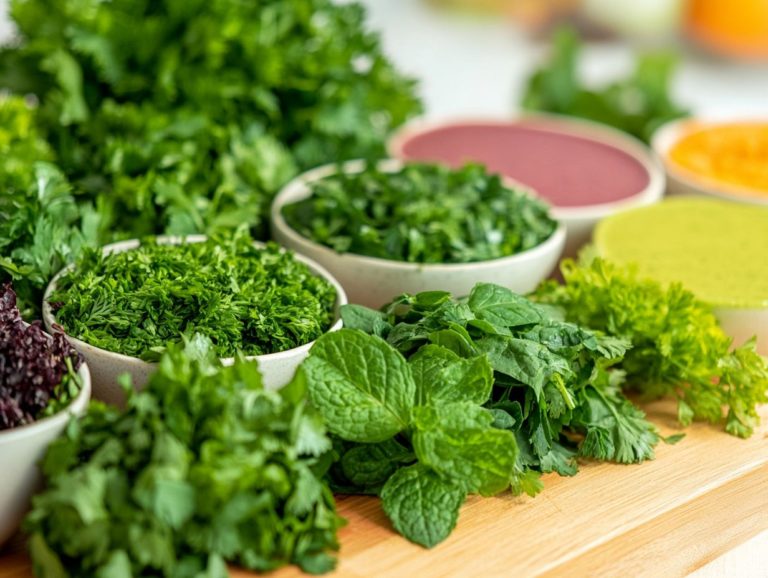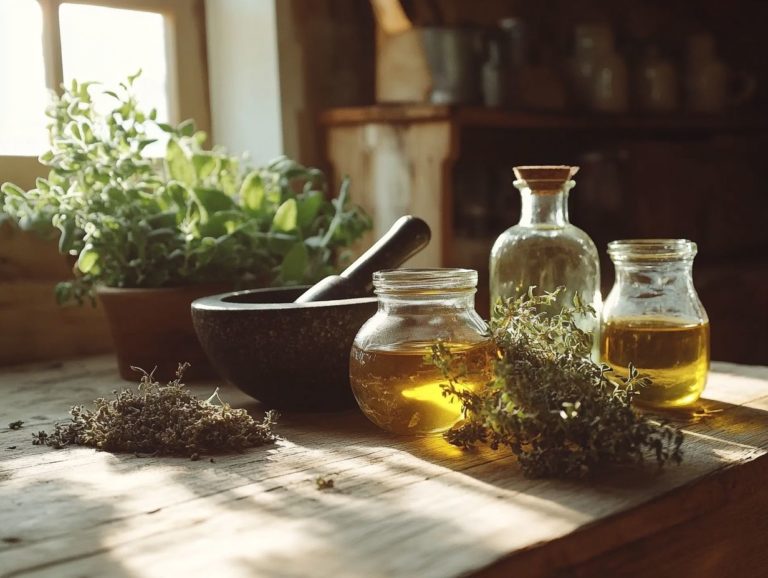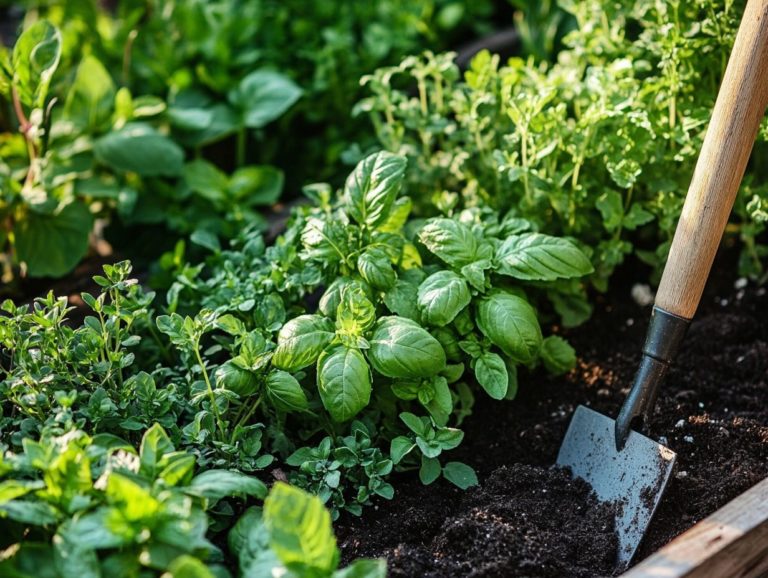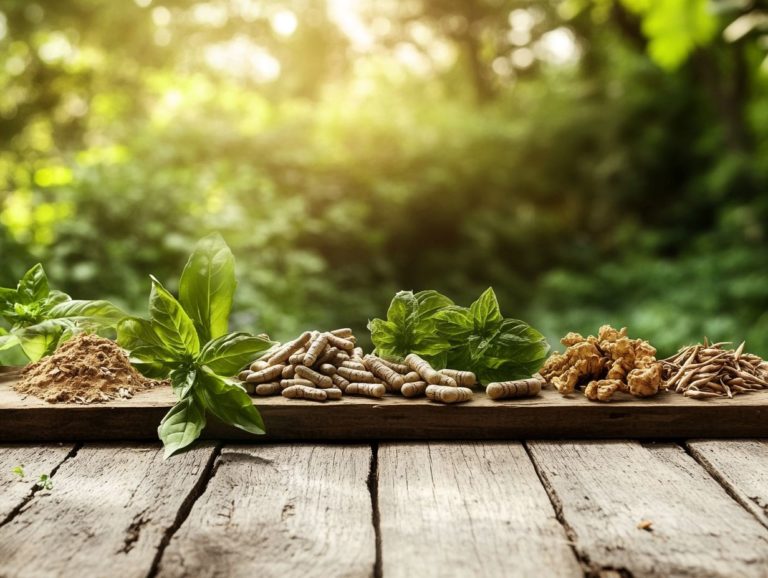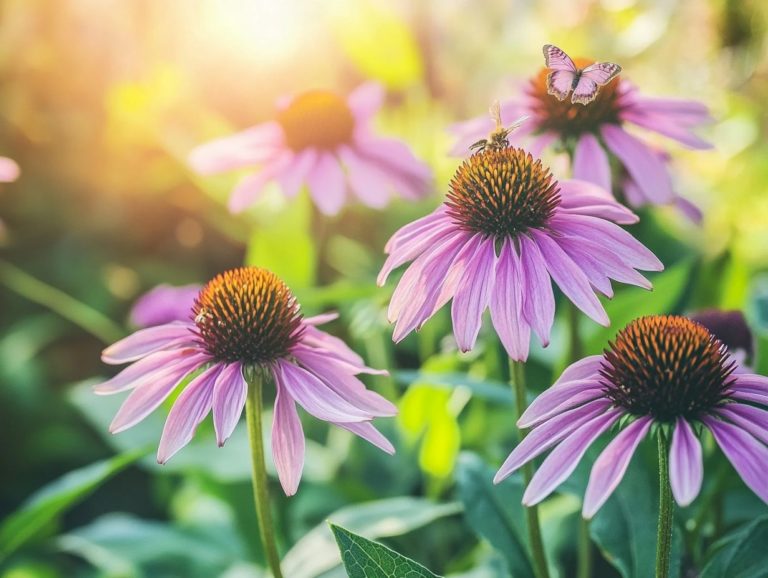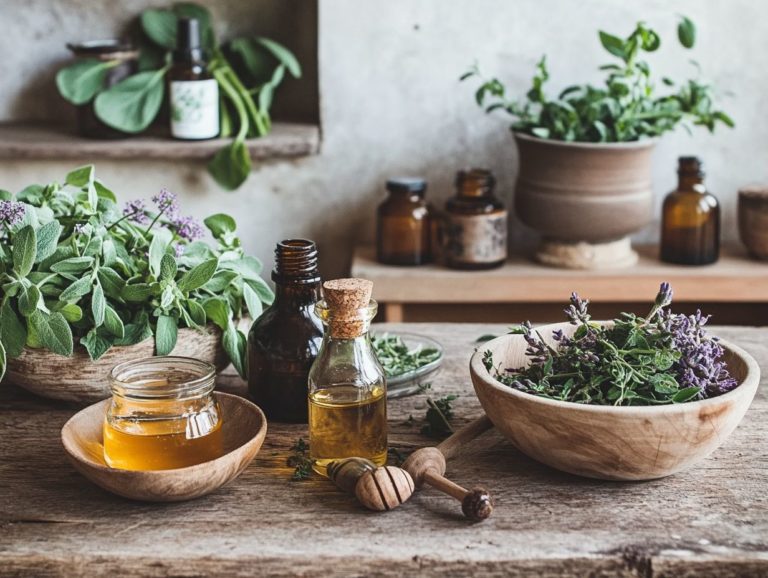Top 10 Herbal Remedies for Stress Relief
In today’s fast-paced world, stress often feels like an unwelcome companion, subtly influencing your well-being and daily life. But fear not nature provides a treasure trove of herbal remedies designed to help you alleviate that stress and usher in a sense of calm.
This article delves into the top 10 herbs celebrated for their stress-relieving properties, ranging from the soothing embrace of chamomile to the invigorating lift of rhodiola.
You’ll learn to recognize the signs of stress, understand how these remedies work, and discover tips for seamlessly integrating them into your life, paving the way for a more balanced and peaceful existence.
Uncover how you can naturally reclaim your tranquility!
Contents
- Key Takeaways:
- 1. Chamomile
- 2. Lavender
- 3. Ashwagandha
- 4. Valerian Root
- 5. Passionflower
- 6. Lemon Balm
- 7. Rhodiola
- 8. Kava
- 9. Holy Basil
- 10. St. John’s Wort
- What Is Stress and How Does It Affect the Body?
- What Are the Common Symptoms of Stress?
- How Can Herbal Remedies Help with Stress Relief?
- What Are the Possible Side Effects of Using Herbal Remedies for Stress Relief?
- How Can One Incorporate Herbal Remedies into Their Daily Routine?
- What Are Some Other Natural Ways to Manage Stress?
- When Should One Consult a Doctor for Stress Relief?
- How Can One Prevent Stress in the Future?
- What Are Some Additional Tips for Managing Stress?
- What Are the Best Herbal Remedies for Different Types of Stress?
- Frequently Asked Questions
- 1. What are the top 10 herbal remedies for stress relief?
- 2. How do these herbal remedies help with stress relief?
- 3. Can these herbal remedies be used as an alternative to medication for stress relief?
- 4. Are there any precautions to keep in mind when using these herbal remedies?
- 5. How should these herbal remedies be taken for stress relief?
- 6. Are there any other natural methods that can be used for stress relief?
Key Takeaways:
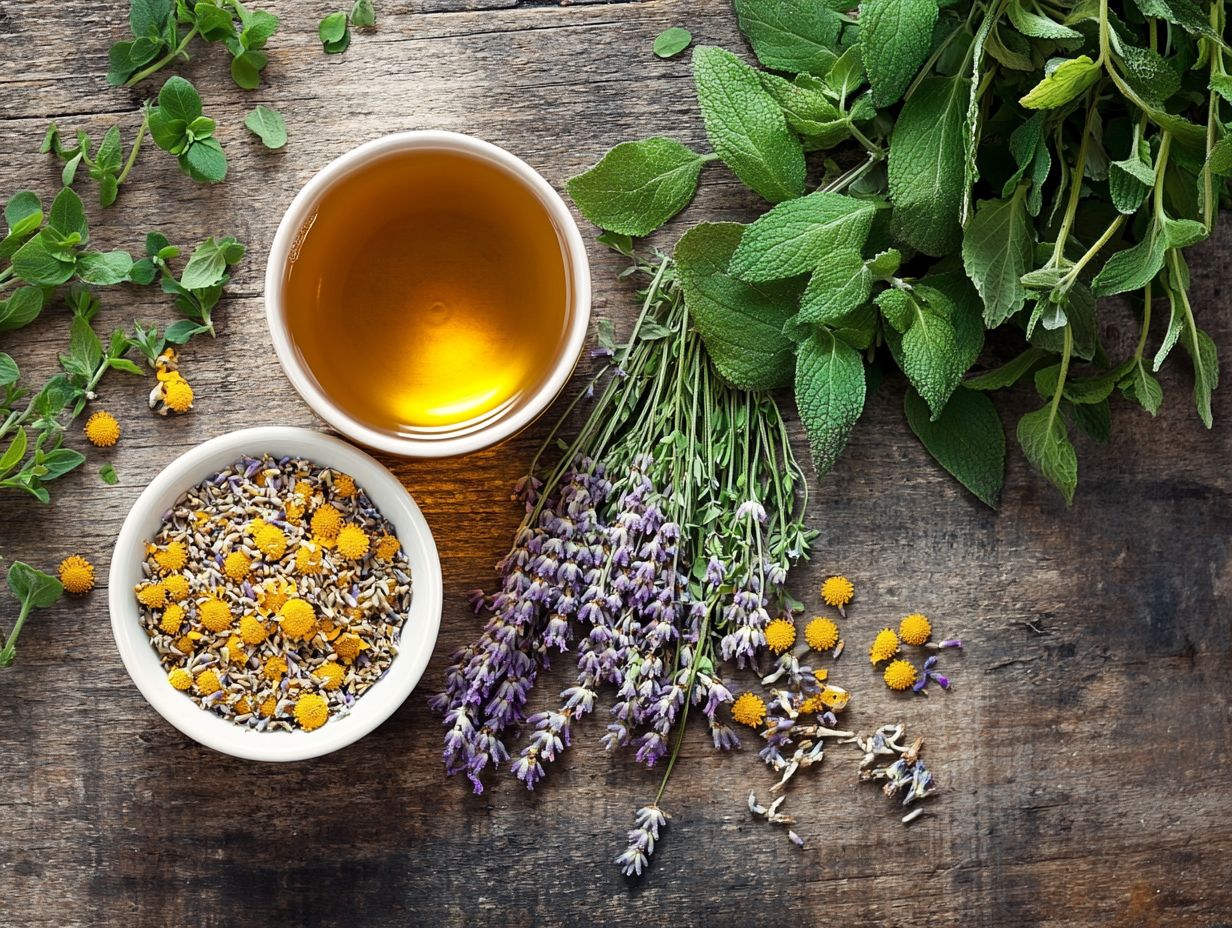
- Chamomile and Lavender are popular herbs for reducing stress and anxiety due to their calming properties.
- Ashwagandha and Holy Basil are adaptogenic herbs that help the body cope with stress and promote relaxation.
- Incorporating herbal remedies into daily routines helps prevent stress.
1. Chamomile
Chamomile, a cherished soothing herb, has been a go-to for centuries in the realm of herbal medicine, celebrated for its calming properties.
This essential ally is perfect for anyone looking to ease anxiety and reduce stress in their daily life. Its gentle influence on the nervous system helps create a serene atmosphere.
This natural remedy not only invites relaxation but also supports your overall mental health by alleviating symptoms of emotional disturbances like irritability and mood swings.
With consistent use, chamomile can enhance your sleep quality, ensuring that both your mind and body are adequately replenished. By incorporating this herbal solution into your routine, you can cultivate a deeper sense of well-being and better equip yourself to tackle life’s various stressors.
2. Lavender
Lavender, renowned for its enchanting fragrance and calming properties, is a powerful ally in herbal remedies designed to alleviate stress and foster emotional balance.
This versatile herb seamlessly integrates into various relaxation techniques, especially in aromatherapy. Its essential oil is skillfully diffused to create a calm space.
The soothing aroma serves as a gentle cue for those seeking respite from daily stresses, inviting the mind to unwind and the body to relax.
Many individuals find that incorporating lavender into their meditation practices deepens their sense of tranquility and mindfulness. Research backs its effectiveness in reducing anxiety levels, making it a favored choice for enhancing the mind-body connection and promoting overall well-being.
3. Ashwagandha
Discover how Ashwagandha can transform your stress management! This highly esteemed adaptogen in Ayurvedic medicine helps you adapt to chronic stress by regulating the HPA axis (the system that controls your stress response) and balancing stress hormones.
This ancient herb has been cherished for centuries, not just for its ability to boost physical vitality but also for its profound impact on mental well-being.
By promoting relaxation and enhancing cognitive function, it plays a vital role in supporting your nervous system.
Its traditional use in stress management underscores its effectiveness, while contemporary research further affirms its ability to alleviate anxiety symptoms.
Studies reveal that regular consumption of Ashwagandha can lead to significant reductions in perceived stress levels, making it an invaluable ally for anyone looking to cultivate mental resilience in the face of life’s challenges.
4. Valerian Root
Valerian Root is a powerful herbal remedy renowned for its ability to foster deep relaxation and enhance sleep quality. It is an excellent choice for anyone grappling with stress and emotional challenges.
Historically, this extraordinary plant has been embraced in traditional medicine across various cultures, tracing back to ancient Greece and Rome. Healers of those times recognized its calming effects on the nervous system, showcasing its enduring legacy.
Valerian Root has built a solid reputation for its effectiveness in alleviating anxiety symptoms and fostering a sense of tranquility. By addressing the root causes of emotional unrest, this herbal solution offers a compelling approach to stress management, enabling you to find your equilibrium and reclaim your inner peace.
The natural compounds within Valerian work together harmoniously to soothe the mind, making it an attractive option for those who prefer a natural way to wellness.
5. Passionflower
Passionflower truly shines among calming herbs, celebrated for its remarkable ability to ease anxiety and enhance emotional well-being. It s no wonder that herbal medicine aficionados hold it in such high regard.
This extraordinary herb contains active compounds like flavonoids, glycosides, and alkaloids that work together to provide tranquilizing effects. These compounds are thought to engage specific receptors in the brain, fostering relaxation and alleviating tension.
You can enjoy passionflower in various forms teas, tinctures, capsules, or extracts allowing you to choose the method that seamlessly fits your lifestyle. By incorporating this versatile herb into your daily routine, you may find it significantly easier to navigate stress and achieve a sense of calm and balance.
6. Lemon Balm
Lemon balm has been a go-to herb for generations, known for its soothing properties. It offers a natural way to ease anxiety and enhances your stress management practices.
This versatile herb presents itself in various forms, from herbal teas to tinctures, each providing a distinct experience of its calming effects. When you brew lemon balm as a tea, it envelops you in gentle warmth that delights the senses and helps settle the mind, making it the ideal companion during stressful moments.
By supporting mental health and fostering emotional balance, lemon balm becomes a valuable ally in your pursuit of wellness.
7. Rhodiola
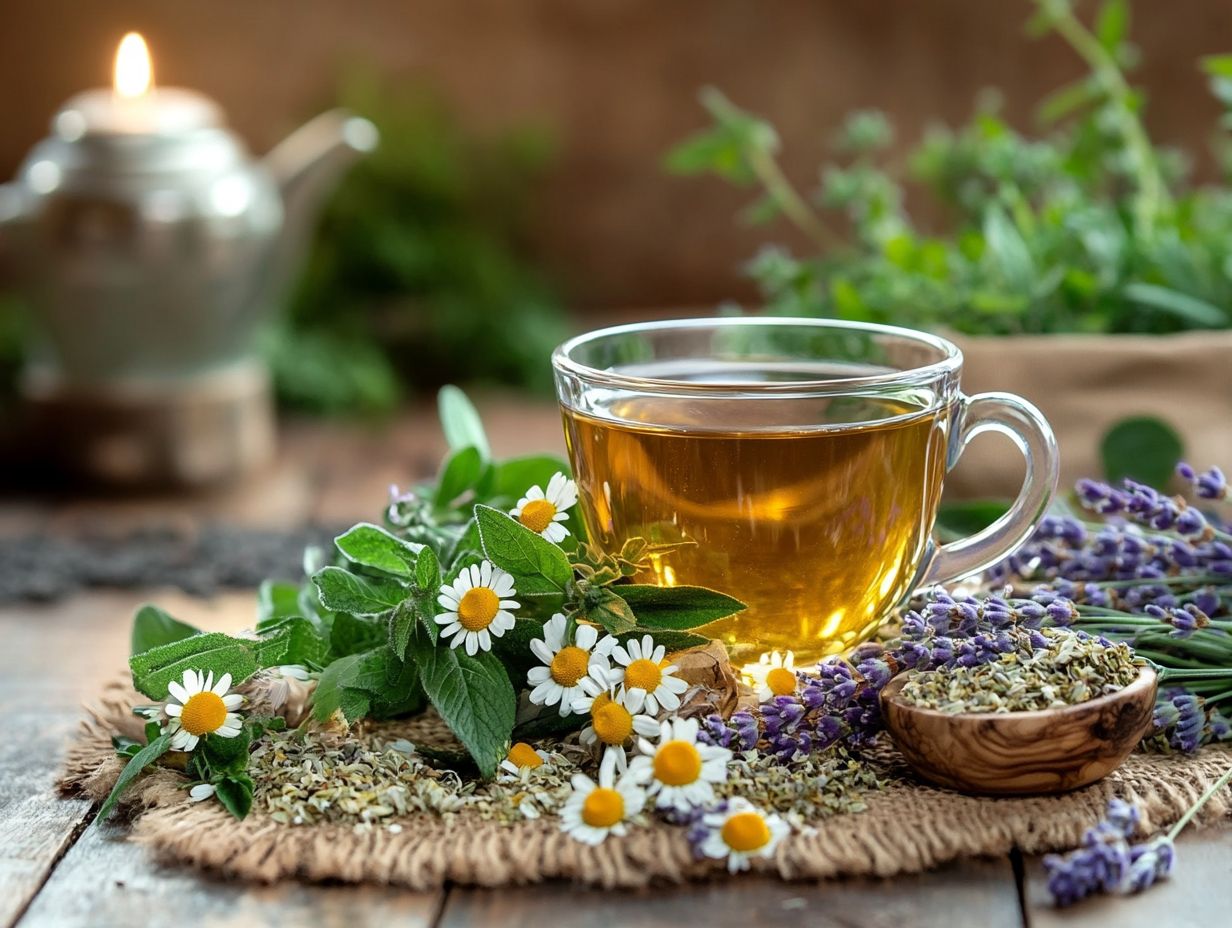
Rhodiola, a remarkable adaptogen, stands out for its impressive ability to enhance both physical health and mental resilience, particularly in the face of chronic fatigue and stress-related symptoms.
This ancient herb has been valued in traditional medicine for enhancing energy levels and stamina, especially in regions like Siberia. Research underscores Rhodiola’s role in modulating cortisol levels the hormone primarily linked to stress. By promoting a balanced stress response, it helps you and others in demanding professions maintain focus and clarity.
In clinical studies, individuals who supplemented with Rhodiola reported notable reductions in anxiety and fatigue levels, highlighting its potential as a natural remedy for those navigating high-pressure environments. These benefits not only bolster mental well-being but also enhance overall performance and resilience.
8. Kava
Kava, a cherished herbal remedy from the South Pacific, presents remarkable benefits for stress relief and is widely acknowledged for its effectiveness in easing anxiety and depression.
This esteemed plant has been woven into the fabric of various cultural ceremonies for centuries, emphasizing its historical significance in traditional medicine. Communities have turned to kava for its soothing effects and as a means of fostering connection and relaxation among its users.
While the root is lauded for promoting tranquility, it s essential to remain mindful of the potential side effects tied to its consumption, such as dizziness and liver complications. Explore the remarkable benefits of Kava today, but be mindful of its potential side effects to make informed choices as you explore its ancient, calming qualities.
9. Holy Basil
Holy Basil, commonly known as Tulsi, is a revered herb in Ayurvedic tradition. It is celebrated for its ability to help your body adapt to stress and enhance emotional well-being.
This extraordinary plant not only fosters relaxation but also plays a crucial role in optimizing the sympathetic nervous system s function, making it a valuable companion during moments of anxiety or tension. It also contributes to immune support through its anti-inflammatory properties, effectively strengthening your body s defenses against illness.
By embracing its holistic health benefits, you can join a long line of cultures that have honored Holy Basil not merely for its medicinal properties but also for its spiritual significance. Many incorporate it into rituals and daily practices, highlighting the profound connection between body, mind, and spirit.
10. St. John’s Wort
St. John’s Wort has emerged as a noteworthy herbal remedy for enhancing emotional balance and alleviating symptoms related to stress, especially for those grappling with anxiety and depression.
This remarkable herb is lauded for its active compounds, notably hypericin and hyperforin, which are pivotal to its therapeutic benefits. These compounds are thought to influence neurotransmitter activity in the brain, particularly serotonin, uplifting your mood and easing feelings of agitation.
Traditionally embraced by various cultures for centuries, St. John’s Wort has smoothly integrated into modern herbal medicine. Today, health professionals are excited to recommend it as a natural alternative to pharmaceutical antidepressants. Its rising popularity reflects a growing interest in holistic approaches to mental well-being and the pursuit of natural solutions for everyday emotional hurdles.
What Is Stress and How Does It Affect the Body?
Stress is a natural response to perceived threats or challenges, manifesting in both psychological and physical forms. When stress lingers and becomes chronic, it can significantly impact your health.
This complex issue includes emotional stress, often stemming from personal relationships and life events, as well as psychological stress tied to anxiety or unresolved trauma. When stress lingers, it creates a cycle of tension that hampers your body s systems.
It can trigger your sympathetic nervous system to go into overdrive, preparing you for a fight-or-flight response. While this reaction is crucial in short bursts, staying in that heightened state can lead to negative consequences.
Prolonged activation may elevate your heart rate, compromise your immune function, and even cause hormonal imbalances. This underscores the importance of implementing effective stress management techniques to restore balance and enhance your overall well-being.
What Are the Common Symptoms of Stress?
Common symptoms of stress can manifest in a variety of ways, including:
- Emotional disturbances like anxiety and depression
- Physical signs such as chronic fatigue and tension headaches
These symptoms often intertwine, impacting your daily life and personal relationships. For example, you might find yourself feeling more irritable or struggling to concentrate, which can lead to conflicts at work or home.
Physiological responses, such as an increased heart rate or digestive issues, can also arise, signaling a deeper imbalance. Recognizing these signs is crucial, as awareness enables you to seek healthier coping strategies whether through meditation, exercise, or professional support.
Ultimately, addressing these symptoms not only promotes better mental clarity but also enhances your overall physical well-being.
Are you feeling overwhelmed by stress? It s essential to recognize these signs and take action towards better stress management and emotional balance.
How Can Herbal Remedies Help with Stress Relief?
Herbal remedies, especially adaptogens, are vital for stress relief. They help your body adapt to stress and promote emotional well-being through natural healing.
Natural substances like ashwagandha, rhodiola, and holy basil offer impressive results. For example, ashwagandha can lower cortisol levels, which are linked to stress.
Rhodiola boosts mental resilience, while holy basil can decrease anxiety and improve mood.
These herbs work by balancing hormonal responses and enhancing brain chemicals. Incorporating them into your health plan can lead to significant benefits.
What Are the Possible Side Effects of Using Herbal Remedies for Stress Relief?
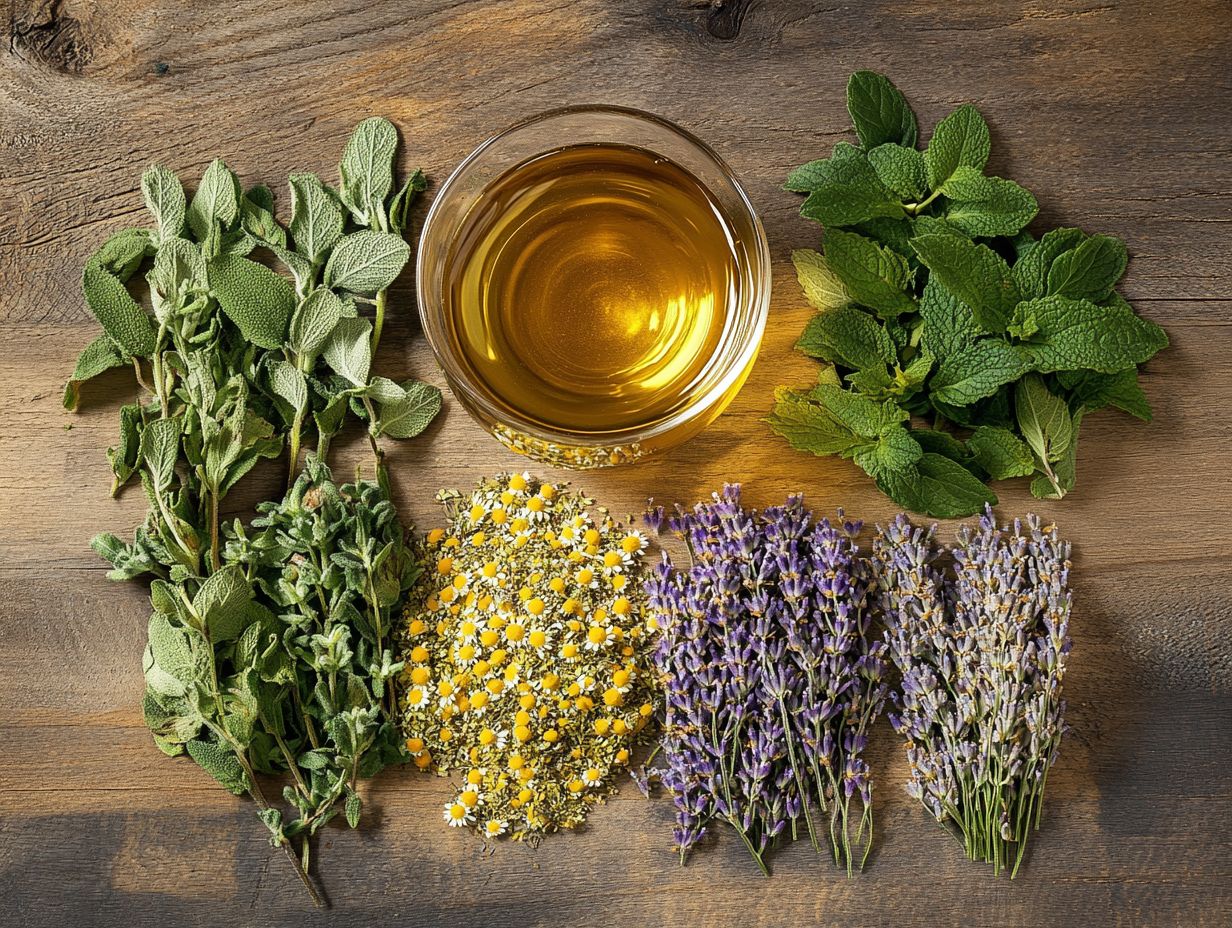
It s important to be aware of potential side effects. These can vary based on individual responses and interactions with other medications.
For example, certain herbs like St. John’s Wort can interfere with prescription drugs, leading to unintended consequences.
Some individuals might experience allergic reactions or gastrointestinal issues when trying new remedies.
Therefore, if you have pre-existing health conditions, discuss your options with a healthcare provider. This ensures safety and personalized recommendations, enabling informed decisions about incorporating herbal treatments into your overall wellness strategy.
How Can One Incorporate Herbal Remedies into Their Daily Routine?
Start your day with a warm cup of herbal tea perhaps chamomile or lavender to set a calming tone. You might explore herbal supplements like ashwagandha or rhodiola for an accessible lift whenever needed.
Cooking with herbs such as basil or rosemary not only elevates your meals but also introduces beneficial compounds that support well-being.
Consistency is key; making these practices regular habits can amplify their positive effects and foster a more enriching approach to your health.
What Are Some Other Natural Ways to Manage Stress?
Along with herbal remedies, explore a multitude of natural ways to manage stress, from meditation and yoga to physical activities that enhance emotional well-being.
These approaches promote relaxation and deeper awareness of your thoughts. Mindfulness practices like breathing exercises and journaling help you stay present, reducing anxiety about the past or the future.
Regular exercise releases endorphins your body’s natural mood lifters while dietary adjustments, like adding Omega-3 fatty acids and antioxidants, bolster brain health.
By embracing this holistic framework, you nurture both mental and physical health, establishing resilience to tackle everyday stressors with grace.
When Should One Consult a Doctor for Stress Relief?
Consulting a doctor for stress relief becomes essential when stress-related symptoms linger or intensify. This is particularly important for healthcare workers and those grappling with chronic stress or deep emotional disturbances.
You might notice symptoms like increased worry, persistent fatigue, frequent headaches, or a marked decline in your work performance. If daily tasks start to feel overwhelmingly burdensome or if your relationships suffer due to emotional ups and downs, it s crucial to recognize that self-care techniques like meditation or exercise might not be enough.
In these situations, seeking medical advice can offer valuable insights and personalized strategies to help you regain control of your mental well-being. Remember, acknowledging the need for professional support is a significant step toward recovery and can greatly enhance your overall quality of life.
How Can One Prevent Stress in the Future?
Preventing future stress requires a proactive approach. This includes adopting health strategies, utilizing adaptogens, and implementing lifestyle changes designed to foster emotional balance and resilience.
By prioritizing self-care, you can lay a strong foundation for your mental well-being. Engaging in activities that bring you joy and relaxation such as a leisurely walk, practicing mindfulness, or immersing yourself in a favorite hobby serves as a powerful buffer against life s stressors.
Surrounding yourself with a supportive social network offers companionship and a vital resource for navigating challenges. Incorporating adaptogens into your routine can enhance long-term stress management. These natural compounds help your body adapt to stress, promoting a sense of calm and clarity during turbulent times.
What Are Some Additional Tips for Managing Stress?
Managing stress effectively calls for a multifaceted approach. This approach combines various relaxation techniques, calming herbs, and sustainable lifestyle changes to enhance your emotional well-being.
To embark on this journey, consider incorporating herbal remedies like chamomile or lavender, known for their soothing qualities. Engaging in regular physical activity whether it’s a gentle stroll or an invigorating workout can significantly lower your stress levels. This is achieved by releasing endorphins, your body’s natural mood boosters.
Practicing mindfulness through meditation or deep breathing exercises cultivates a greater sense of calm and presence in your daily life. Together, these strategies not only alleviate stress but also contribute to your overall health and resilience, creating a supportive environment for mental clarity and emotional balance.
What Are the Best Herbal Remedies for Different Types of Stress?
Identifying the best herbal remedies for various types of stress can significantly enhance your emotional balance and overall well-being. Adaptogens play a pivotal role in this journey.
Understanding that stress manifests in different forms whether it’s chronic stress, anxiety-induced stress, or acute stress enables you to tailor your approach effectively. For example, if you re grappling with chronic stress, you might benefit from the calming properties of ashwagandha. If anxiety is your main concern, the soothing nature of chamomile tea could provide the comfort you seek.
By recognizing your personal triggers and stressors, you can choose herbs that resonate with your unique experiences. This allows you to establish a more effective and personalized herbal regimen. Ultimately, this approach addresses specific symptoms and nurtures a holistic sense of tranquility and resilience, guiding you toward a more balanced life.
Frequently Asked Questions
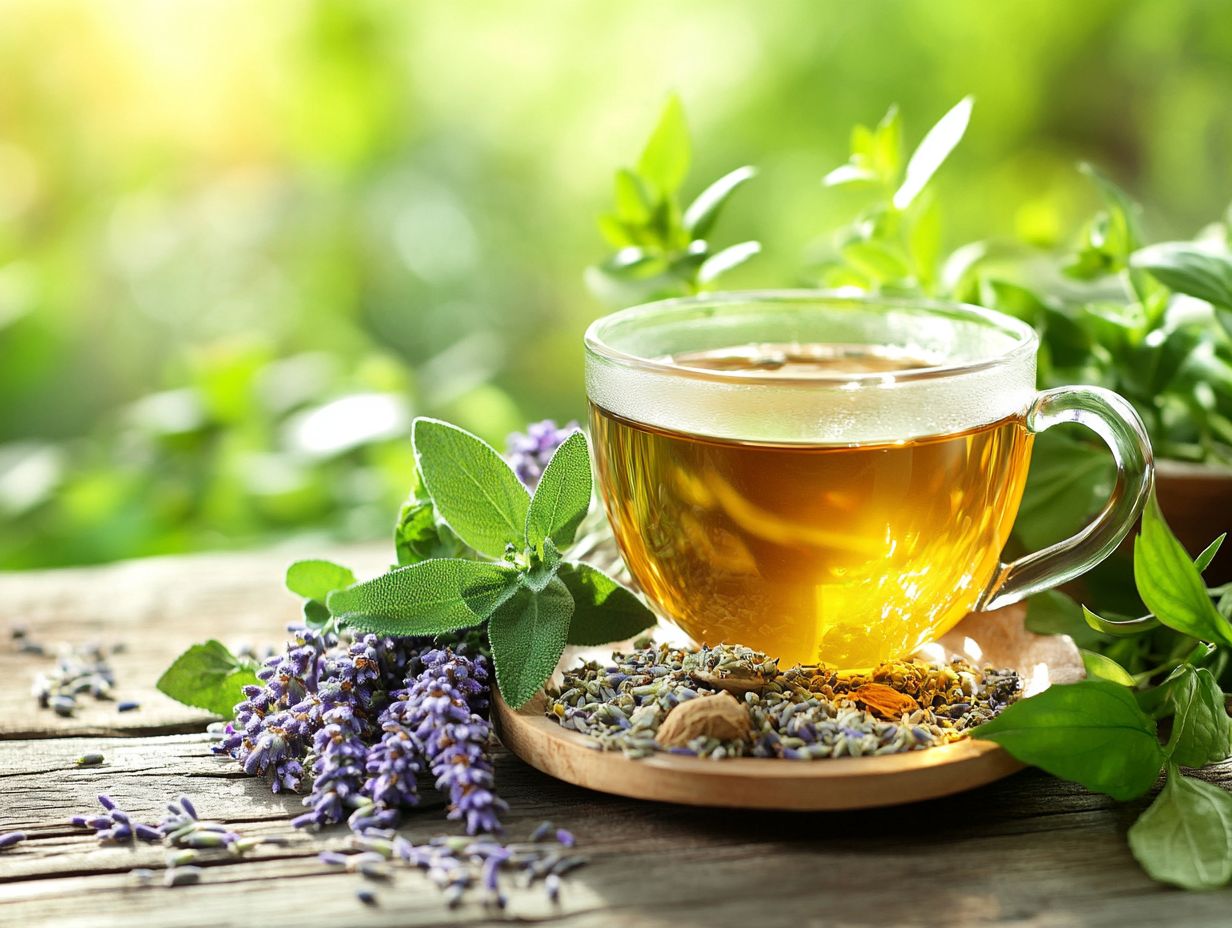
1. What are the top 10 herbal remedies for stress relief?
The top 10 herbal remedies for stress relief are:
- Ashwagandha
- Valerian root
- Lemon balm
- Passionflower
- Chamomile
- Kava kava
- Lavender
- Rhodiola
- Holy basil
- Skullcap
2. How do these herbal remedies help with stress relief?
These herbal remedies contain natural compounds that have calming and relaxing effects on the body. They help reduce stress and anxiety while promoting better sleep and overall well-being.
3. Can these herbal remedies be used as an alternative to medication for stress relief?
Consult a healthcare professional before using these remedies as a substitute for medication. They may interact with certain medications or have potential side effects.
4. Are there any precautions to keep in mind when using these herbal remedies?
Follow the recommended dosage and do not exceed the suggested amount. Pregnant or breastfeeding women and those with existing health issues should consult their healthcare provider before using these remedies.
5. How should these herbal remedies be taken for stress relief?
You can enjoy these herbal remedies in different forms, including teas, tinctures, or capsules. Be sure to follow the instructions on the label or consult a healthcare professional for proper dosage and usage.
6. Are there any other natural methods that can be used for stress relief?
Practicing relaxation techniques can also help reduce stress. Techniques such as deep breathing, meditation, and yoga promote a sense of calm.
Regular exercise, a healthy diet, and getting enough sleep contribute to better stress management.

